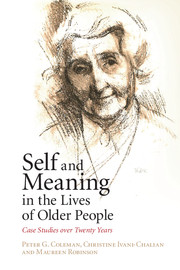Book contents
- Frontmatter
- Dedication
- Contents
- Preface and acknowledgements
- 1 Living a long life – why survive?
- 2 From self-esteem to meaning – studying psychological well-being in later life
- 3 Investigating older people's lives at the end of the twentieth century
- 4 Ageing together
- 5 Adaptation to loss of spouse
- 6 Ageing alone
- 7 Women becoming frailer
- 8 Men becoming frailer
- 9 Towards one hundred years
- 10 The future of later life: personal and policy perspectives on ageing and meaning
- Appendix: Participant characteristics
- References
- Index
1 - Living a long life – why survive?
Published online by Cambridge University Press: 05 May 2015
- Frontmatter
- Dedication
- Contents
- Preface and acknowledgements
- 1 Living a long life – why survive?
- 2 From self-esteem to meaning – studying psychological well-being in later life
- 3 Investigating older people's lives at the end of the twentieth century
- 4 Ageing together
- 5 Adaptation to loss of spouse
- 6 Ageing alone
- 7 Women becoming frailer
- 8 Men becoming frailer
- 9 Towards one hundred years
- 10 The future of later life: personal and policy perspectives on ageing and meaning
- Appendix: Participant characteristics
- References
- Index
Summary
The ageing of the world's population has become one of the major concerns of the twenty-first century, yet it is sad that attitudes of ‘concern’ seem to outweigh the satisfaction that should arise from present civilization's achievement in enabling more and more people to live to the advanced ages that previously were reserved for a small minority of the population. The concerns are understandable in that they relate primarily to the frailties, physical and mental, that increase in the ninth and tenth decades of human life. Despite the advance warnings of demographers over the past fifty years, society has begun to adapt only slowly to the implications of an ageing population. In particular, it has failed to make the huge quantitative and qualitative changes to social care provision that the situation requires. As a result, individual ageing is beginning to seem almost an unwanted burden even after a life of considerable economic contribution. Contemporary culture seems more youth focused than ever in the innovations it encourages, the media representations of different age groups and the values and goals it prescribes. Ageism and ageist language remain firmly embedded in Western culture despite some recent advances in legislation to combat discrimination, and are even influencing other world cultures that were previously more respectful of age.
Robert Butler, a physician, psychiatrist and founding director of the US National Institute on Aging, addressed these issues forty years ago in his book Why Survive? Being Old in America (Butler, 1975). Since then the question of the meaning of living a long life has become more acute, as conditions for the oldest among us appear to be deteriorating rather than improving. If contemporary people were to choose the age at which they would die, would they decide to live to an advanced age with the likely implications of increasing frailty and sense of burden? Certainly many younger people appear not to want to survive to this state of being.
- Type
- Chapter
- Information
- Self and Meaning in the Lives of Older PeopleCase Studies over Twenty Years, pp. 1 - 5Publisher: Cambridge University PressPrint publication year: 2015



